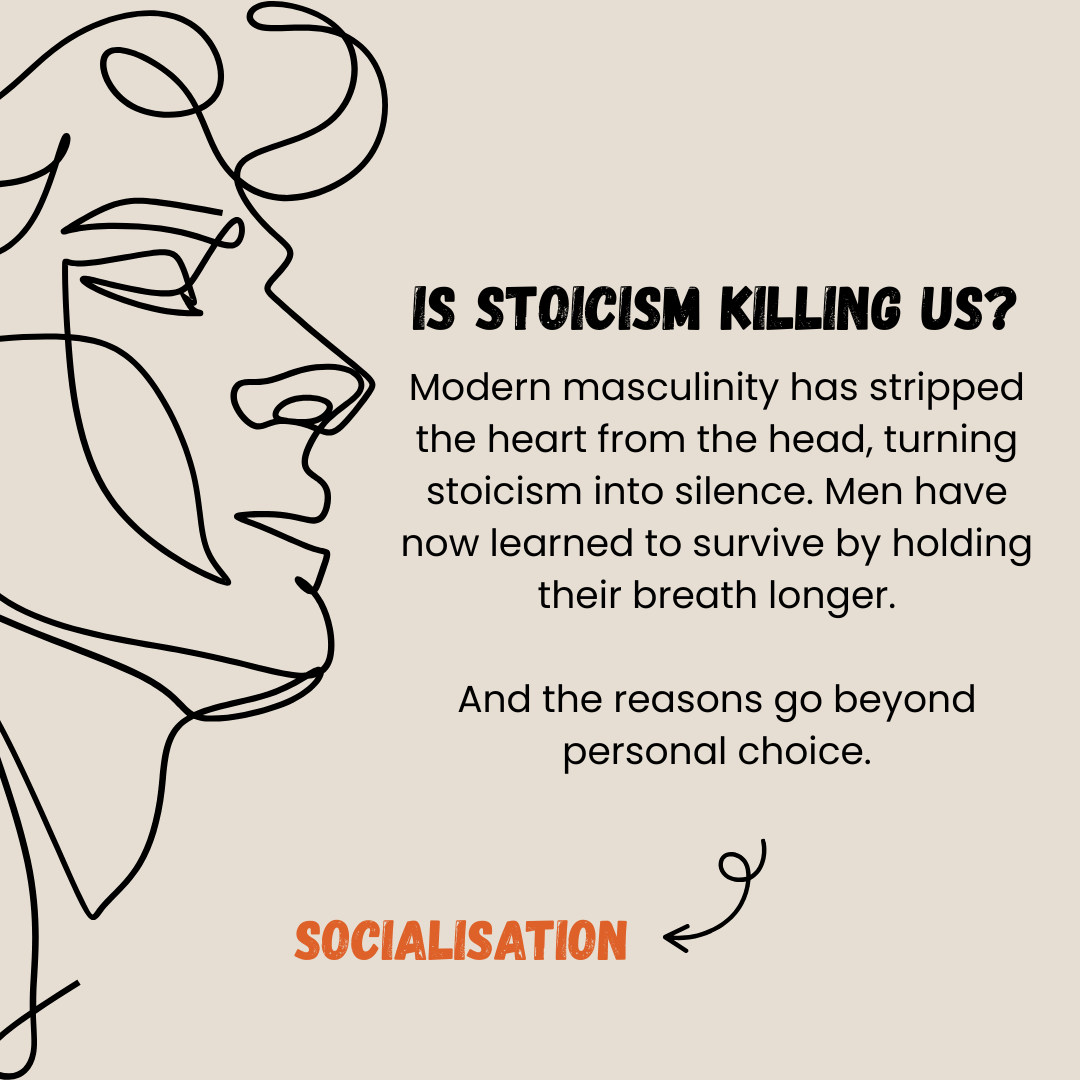
He’s the one who doesn’t cry at funerals.
He’s the friend who says, “I’m fine,” even when his world is falling apart.
He’s the colleague who never takes a mental health day.
He’s the partner who silently absorbs the pressure, never asks for help, and keeps smiling.
He is everywhere, and he is hurting.
In many cultures, including Singapore, men are often taught from a young age that emotions are a liability. Vulnerability is weakness. And silence is strength. A quiet acceptance of pain is often cloaked in the revered philosophy of stoicism.
Let’s be clear: Stoicism was never about emotional suppression. Ancient Stoics like Marcus Aurelius believed in resilience but also in self-reflection, compassion, and reasoned emotional expression. It’s about knowing your feelings and continuing to carry forward. It’s about saying, “I need help,” or “I’m not okay today,” and realising that honesty doesn’t make you any less of a man.
Then why are men waiting longer, speaking less, and suffering alone?
Somehow, modern masculinity stripped the heart from the head, turning stoicism into silence.
And the reasons go beyond personal choice. They’re deeply rooted in socialisation.
Modern society still clings to the image of the “strong, silent type.” Boys are told to “man up.” Tears are for girls. Emotional restraint is equated with maturity. But this outdated blueprint of masculinity doesn’t leave room for grief, heartbreak, anxiety, or even joy expressed too loudly. Behind the composed face, many men are silently grappling with depression, burnout, and loneliness. And because they’ve been taught not to name or share those emotions, they often don’t seek help until the pain becomes too loud to ignore.
And there are numbers to show for it as well. Globally, suicide rates among men are significantly higher than among women. In Singapore, as in many parts of the world, men are less likely to seek mental health support despite showing clear signs of psychological distress. A 2024 study published in Psychiatry International explored the role of masculinity in male suicide and found that men who firmly adhered to traditional masculine norms were significantly more likely to experience suicidal thoughts or attempt and/or die by suicide.
It is essential to acknowledge that repressed emotion doesn’t disappear; it festers. It shows up in chronic stress, aggressive outbursts, addiction, and numbness. Over time, it affects the individual and the relationships they hold dear.
- A father who cannot tell his child “I love you” because he never heard it himself.
- A partner who withdraws emotionally, not out of disinterest, but because vulnerability feels unsafe.
- A friend who stops responding, not out of neglect, but because he doesn’t know how to talk about what’s wrong.
When men are told to carry everything and express nothing, the emotional burden doesn’t vanish. It just isolates.
So what if we reimagined masculinity?
What if being a man meant being in touch with your emotions?
What if strength included knowing when to ask for support?
What if resilience meant bending instead of breaking?
Imagine a world where men speak openly about their therapy sessions, similar to how they talk about fitness routines, where a father hugs his son without awkwardness and the “you’ll be okay” is replaced with “I hear you. I’m here.”
Sounds good, right?
The best part is that such a change doesn’t require a grand revolution. It begins in small, conscious steps:
- Start by naming your emotions. Even just saying, “I feel overwhelmed” or “I’m not sure what this is, but it’s heavy” is powerful.
- Have one honest conversation. Open up to a friend, a therapist, or even a journal. Vulnerability isn’t weakness. It’s a bridge to connection.
- Model emotional courage. If you’re in a position to lead at home, at work, or in your community, create space for others to share, too.
- Challenge the myths. Call out phrases like “man up” or “real men don’t cry.” Language shapes culture.
- Seek support early. Therapy isn’t just for when things fall apart. It can be a place to understand, unlearn, and grow.
These steps may seem simple, but collectively, they’re how we begin to redefine strength.
To the men reading this: you do not have to hold it all together. You are allowed softness. You are allowed sadness. And above all, you are allowed to be human.
To the people around them: ask how they are… really. And when they hesitate, give them the safety to speak. Break the silence by meeting it with presence, not pressure.
Let us not lose more lives to emotional invisibility. Let us not worship stoicism at the cost of connection. Because being a man shouldn’t feel like walking through life in emotional chains. It’s time we shift the narrative from stoicism to wholeness and from silence to voice.
If you feel you need professional help and emotional support, please reach out to EMCC. Help is available, and hope is always within reach.
To ensure that our services remain accessible, subsidised counselling is also provided. For more information, click here.

